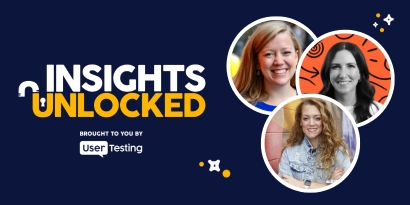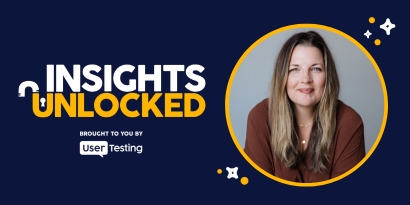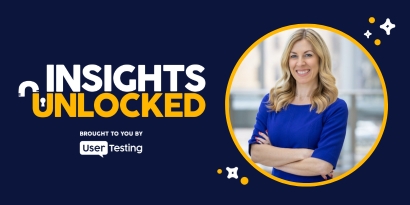
Episode 23 | November 29, 2021
Build better products with user research
Discover how product managers can build better products using user research, no-code tools, and practical training from Product School’s founder.
What it really takes to build better products: Lessons from Product School’s founder
"It may sound scary to talk with customers because it's uncomfortable... but that's not the only way you can get user feedback."
– Carlos González de Villaumbrosia, CEO & Founder of Product School
In a fast-moving digital world where innovation is a currency and customer expectations never sit still, the role of the product manager has evolved into one of the most strategic in business. But what does it truly take to succeed in product management today—and how do teams build better products, faster?
In this episode of Insights Unlocked, we sit down with Carlos González de Villaumbrosia, CEO and founder of Product School, to uncover what product managers need to thrive in 2025 and beyond. Whether you're a new PM, a UX researcher, or a product team leader navigating digital transformation, this conversation is packed with actionable insights and inspiration.
Why product management training matters more than ever
Product School was born out of a clear need: helping professionals transition into product management roles without committing to years of academic study. As Carlos puts it:
“When we started, we were mainly focused on helping aspiring product managers get that first PM job... Now we have much more diversity—engineers, business professionals, designers, all bringing different strengths.”
Today, Product School is a global leader in product management training, with over 1 million community members and a roster of instructors who are also active product leaders from companies like Google, Netflix, and Airbnb.
GUIDE
Proving the ROI of UX research
In this guide, we’ll introduce a plan for calculating the unique ROI of UX research at your organization.
Carlos’s mission? To connect education with employment by making product education accessible and practical for professionals at every stage of their careers.
What makes a great product manager?
If you're picturing a PM as a technical wizard who can out-code developers, think again. Carlos believes the best product managers are:
- Comfortable with ambiguity and resourceful in getting things done—with or without code
- Excellent communicators and collaborators, especially in remote and hybrid environments
- Curious and proactive about connecting with users and gathering insights
“You're not the best at anything—you're not coding, designing, or selling. But you're coordinating everyone to push in the same direction,” he explains.
And one rising skill that can no longer be ignored? User research. “When I started Product School, not too many people would talk about user research," Carlos said. "Now it's really, really hard to ignore. You can't wait for a researcher—PMs have to feel empowered to run their own.”
This highlights a growing demand for user research in product management, where PMs not only interpret analytics but also engage directly with customers to understand the "why" behind the "what."
Building human-centered product teams
Carlos stresses that high-performing product teams aren't just well-organized—they're deeply aligned around user needs and the company's vision. “Alignment and innovation—it’s a trade-off,” he says. “Too much alignment and you slow down. Too much innovation without alignment, and you risk building a Frankenstein product.”
He sees product teams as inherently cross-functional, ideally involving engineering, growth, design, and more. And crucially, he believes every employee—not just PMs—should see themselves as part of the product team.
"Ideally, the product team should be the company. Everyone is in product—including the CEO."
This product-first mindset helps teams stay agile and focused, especially when navigating complex initiatives like digital transformation.
Driving digital transformation with empathy and agility
From banking to retail, legacy organizations are racing to modernize their customer experience. But digital transformation isn’t just about technology—it’s about culture.
Carlos shares insights from Product School’s corporate training programs, noting that transformation only works when there's buy-in from the top and enthusiasm from the teams on the ground.
“You can’t just show up with a book and expect everyone to follow a process. You have to co-create the right solution.”
Key strategies for teams navigating change:
- Secure executive support and invest in product leadership, like hiring Chief Product Officers
- Identify early adopters within teams and empower them as champions
- Focus on agile methodologies that support quick learning and iteration
- Make space for both data-driven decisions and empathy-fueled innovation
Digital transformation requires balancing best practices with a willingness to evolve—another area where product managers play a pivotal role.
The power of user feedback in product strategy
Carlos is adamant that voice of the customer isn’t optional. It’s foundational.
“Data is great to tell you what’s happening. But it doesn’t tell you why. The combination of qualitative and quantitative insights is key.”
While some teams have dedicated UX researchers, many don’t. And even when they do, Carlos believes every product manager should get comfortable running customer feedback loops themselves.
He offers a variety of low-barrier ways to connect with users:
- Run surveys
- Use your help desk or live chat logs to uncover patterns
- Shadow support or sales teams to hear customer pain points firsthand
- Schedule user interviews, even if it’s just 15–30 minutes
"If you’re not talking to customers, you’re building blind."
Carlos includes a UserTesting component as part of Product School’s curriculum—so learners understand how to test ideas and iterate early, not just after launch.
The rise of no-code tools and product democratization
One of the most exciting shifts in the product world, according to Carlos, is the rise of no-code tools that allow creators to build and test without technical barriers.
“Now creators have much more power to build and connect with users without knowing how to code.”
This opens doors for new personas to thrive in product management and supports faster cycles of prototyping, user validation, and iteration.
Combined with trends like increased diversity in product roles and the elevation of Chief Product Officers, the future of product looks more accessible—and more strategic—than ever.
Best practices vs. innovation: Striking the balance
Carlos acknowledges the value of design best practices and established frameworks. But he cautions against blind adoption.
“I’m not a believer in following scrum ceremonies to the T. It's just impossible.”
Instead, he advocates for flexible thinking. Understand the rules—then adapt them. Great PMs should know when to innovate and when to lean on proven models.
Empathy, empowerment, and building the future
Carlos leaves us with a powerful reminder that behind every great product is a team that listens, learns, and iterates with purpose. "The most successful companies embracing change go the extra mile," Carlos said. "It’s not just about standups or checklists—it’s about changing culture."
“I think there is an incredible opportunity to leverage technology to augment our capabilities and together, you know, make an even bigger impact.” — Carlos Gonzalez de Villaumbrosia
Episode links:
- How to include user research in early product development: This blog post emphasizes the importance of integrating user research at the outset of product development to guide the process and avoid costly mistakes.
- Mitigating risk in digital product development: This guide offers strategies for product leaders to minimize risks associated with digital transformation and ensure successful product outcomes.
- Navigating the challenges of product management today: In this webinar, industry experts discuss current trends and challenges in product management, providing insights on how to stay ahead in the field.
- How product managers can define a product vision: This webinar provides guidance on creating a strong product vision that informs strategy and aligns teams.









